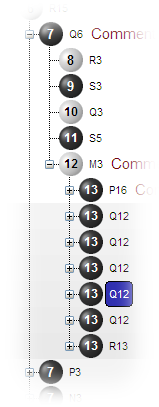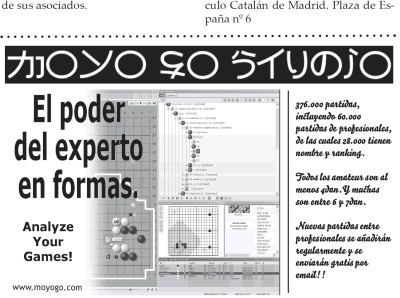My biggest (potential) competitor, Anders Kierulf, is a really nice guy. The first thing he did when I announced my entry in the computer Go field, was sending me his thesis on computer Go. He's probably a lot brighter than I am, too. When I just started with my old SGF Reader, he offered me advice and submitted bug reports. Yesterday I was having some trouble implementing something that SmartGo has as well, and when I finally managed, I thought: "Let's blog about this". I wanted to mention his employment history at Microsoft (arguing that he might hold an advantage over me, because the particular problem I wrestled with was a typical "Microsoft Registry Hell" thing.) So I did a search on his name.
Then I read this
here:
In and around California's Silicon Valley, the part-time directors of a number of small foundations - all the organizations sharing the same accountant - have continued to collect benefits even as their foundations' assets plummeted.
One of them is the Sara and Anders Kierulf Family Foundation, which was established in 1999 in San Carlos, Calif., but relocated to Utah when its sole trustees, Sara and Anders Kierulf, moved to Salt Lake City. The Kierulfs run the foundation out of their home, contributing to a variety of charities. They estimate they each spend 20 hours a week on foundation business for the $120,000 in salary that each of them takes.
They have also used foundation holdings to cover escalating medical costs for themselves and their three children. Last year, the foundation paid nearly $11,000 for the family's health care, up from $7,800 the previous year and $4,100 the year before that. Meanwhile, the foundation's assets dropped by almost a third - from nearly $6 million in 2000 to slightly more than $4 million last year. The foundation's accountant, Martin Logies of Sunnyvale, Calif., defended the benefits, saying they had been approved by the foundation's board of directors. But he acknowledged that Sara and Anders Kierulf are the board's only members, and that they approved the benefits for themselves. As to the work the Kierulfs perform for their pay, Logies demurred. ``I couldn't give you that information,'' he said.But it isn't as bad as it looks! I had been wondering where he got the money to buy the source code of GoTools, Thomas Wolfs' TsumeGo solver. I had assumed Anders was a millionaire, due to Microsoft stock options or something. Because Thomas had alledged to me that he had sold it for hundreds of thousands of USD. He never wanted to be specific, but one of the figures he named was
five hundred thousand dollars. I kid you not. So I had no chance of aquiring it. I tried persuading him to let me have it in return for me making it run much faster, to no avail. If I have to believe the article, Anders spends half of his working week on accountancy, instead of working on SmartGo. Perhaps I still stand a chance catching up with him. Of course this is just a clever tax trick - Anders is
not misappropriating funds but has merely put his 6 million saved dollars in a SmartTax haven.
Yes, there is (potentially) a lot of money to be made with computer Go. Take GoGoD, for example. They say that their business doesn't make a profit. It's a hobby, a service to the Go community. But.. They are well-known, have been at it for a long time. They offer an interesting product. And it's pretty expensive, if you consider the fact that it's almost exclusively freeware and non-copyrightable game records.
They say it's not making them any
profit - All I can say is that I earned 4,000 USD in the first three months of selling Moyo Go. Profit is defined as what you have left after expenses, which makes it a meaningless metric to indicate how much you have
earned. By the way:
Everybody wants a copy of my software,
everybody wants to review it, but
nobody wants to publish any reviews.. (That might have something to do with GoGoD having told the Go publishing world that I am a bad boy for including "their" games in Moyo Go without offering them compensation - a consequence of them spreading
FUD on rec.games.go about ZenHacker, my earlier SGF Reader. GoBase, the Western world's largest Go website, doesn't want to link to me, and mentions on their website that it's a very bad thing to copy "GoGoD's" games, that the poor GoGoD guys are "non-profitably" selling. Well, I don't know. If GoGoD sells as much as I do, they make 16,000 USD/year. But I am pretty sure they sell an order of magnitude more than I do. Everybody knows them, also in Asia. Everybody endorses them. Everybody links to them. They are all over the web. I think they make about a hundred thou a year, and that was exactly the reason they immediately vilified my first
excellent freeware - because it was a clear threat to their business.
The same with GoBase, their business is to give people access to Go games and let them perform searches on them, just like you can with Kombilo on the GoGoD game collection CD. Of course, if folks would have GoBase's games on their local machine and would be able to do much more powerful (and faster!) searches on them, Jan van der Steen's plans to charge his - at least - ten thousand customers
money for his site will be frustrated. If he asks 10 USD/year he'll make a cool hundred thousand USD/year - no wonder he refuses to include MoyoGo in his list of SGF Editors!
Some think that the solution to their problem is not innovation, but
FUD, boycots and libel. In the short term this will have some effect, but in the long term it will derail them even faster because of course in business, one focuses on competing with one's most vociferous competitors
first. Therefore, Moyo Go soon will exceed GoGoD's and GoBase's capabilities, for the sole reason that they chose to make my life difficult. Otherwise I would have been busy making an IGS client or something.
 What's wrong in this picture? (from a commented game by Cornel - no idea which SGF editor was guilty of this). Every time I think I have seen it all, something new comes up. I was wondering why my "automatic branch annotation" put five letters on top of eachother. Must be a bug, right?
What's wrong in this picture? (from a commented game by Cornel - no idea which SGF editor was guilty of this). Every time I think I have seen it all, something new comes up. I was wondering why my "automatic branch annotation" put five letters on top of eachother. Must be a bug, right?




